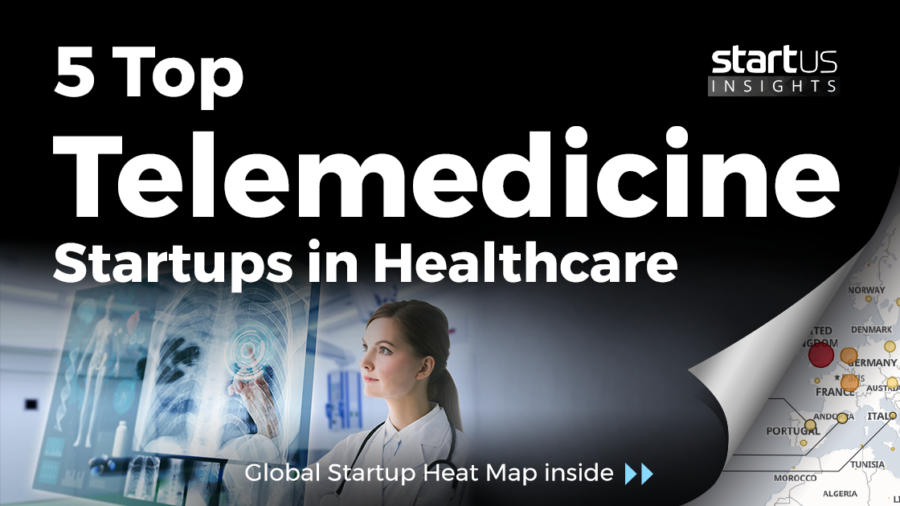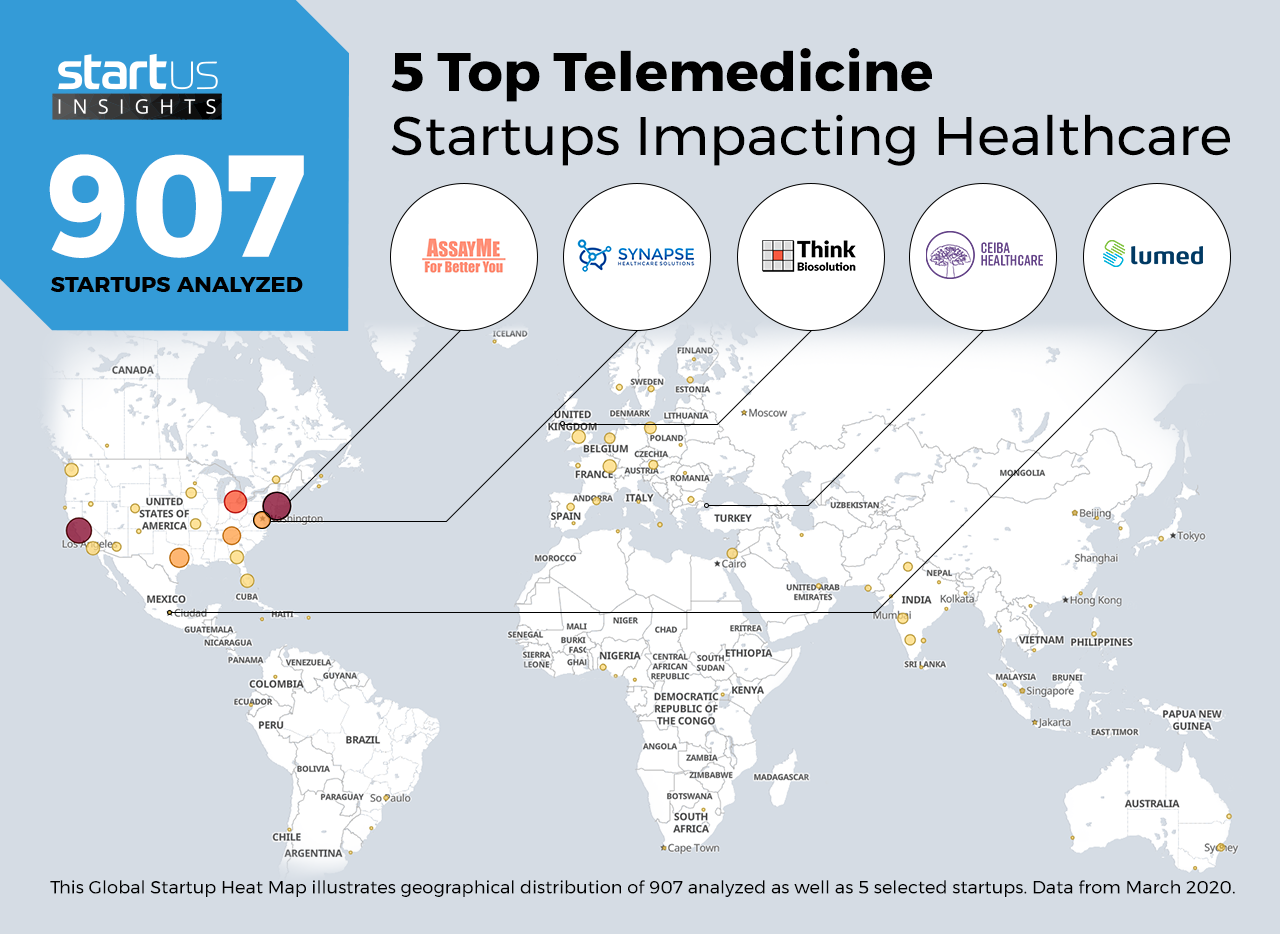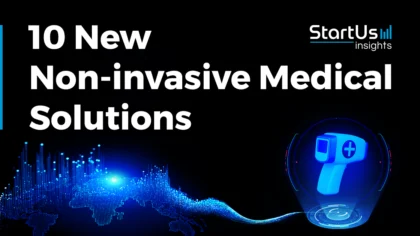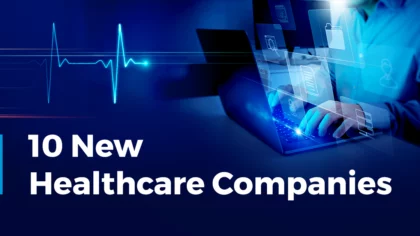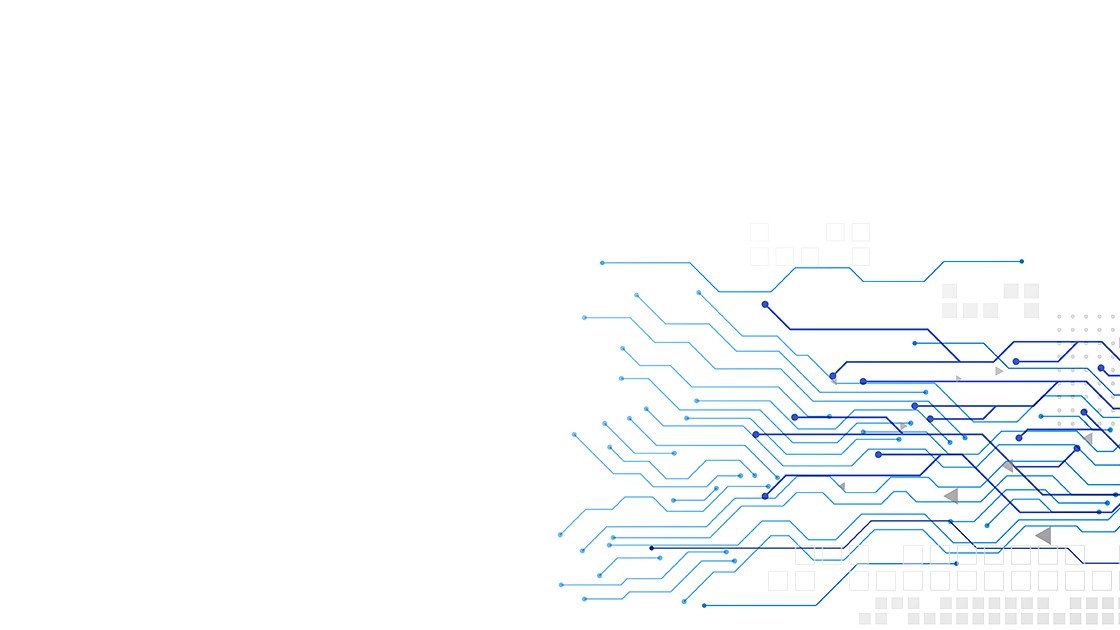Our Innovation Analysts recently looked into emerging technologies and up-and-coming startups working on solutions for the healthcare sector. As there is a large number of startups working on a wide variety of solutions, we decided to share our insights with you. This time, we are taking a look at 5 promising telemedicine startups.
Heat Map: 5 Top Telemedicine Startups
For our 5 top picks, we used a data-driven startup scouting approach to identify the most relevant solutions globally. The Global Startup Heat Map below highlights 5 interesting examples out of 907 relevant solutions. Depending on your specific needs, your top picks might look entirely different.
In the wake of the current Coronavirus pandemic, telemedicine becomes increasingly important. While it makes sure that patients with (chronic) diseases get the care they need, it also contributes to maintaining hospital capacities. Telemedicine, or remote healthcare, has a variety of use cases and application areas, all of which now need to be exhausted in order to be able to keep medical staff, patients, and the larger public from getting infected.
As COVID-19 continues to spread in countries around the globe, let’s have a look at how emerging technologies & the startups that develop them respond to the situation:
Ceiba Healthcare – Intensive Care Unit (ICU) Telemedicine
Intensive care unit telemedicine is an innovative critical care delivery approach, that uses audio, visual or a combination of the two to remotely monitor critical care patients in ICUs. This approach presents a turning point for situations such as the current Coronavirus pandemic as it allows healthcare providers to remotely review patient vital signs, physiological status, and laboratory and diagnostic test results and make care decisions based on these conditions. It also facilitates remote consultations from experts in other locations to improve patient outcomes while lowering the risk of medical staff being exposes to viruses, for example.
Ceiba Healthcare, a startup from Turkey, builds an Artificial Intelligence (AI)-based platform to continuously stream patient vital data from the bedside. The solution integrates with the hospital monitoring systems via a purpose-built two-way platform that does not need any additional hardware. The platform features a smart scoring and alarm system that helps clinicians identify patients at risk or those who are demonstrating signs of deterioration.
Think Biosolution – Remote Monitoring
Telemedicine solutions enable healthcare providers to remotely monitor a patient’s vital signs such as pulse and respiratory rate as well as other health data. Wearables or mobile medical devices are used in this case to easily share medical information. Emerging solutions record and transmit data automatically, generate a report for the physician, and send alerts if any intervention is needed.
Think Biosolution is an Irish startup developing a remote patient monitoring platform for telehealth. The platform integrates its proprietary device, a mobile application, and an electronic health record (EHR) dashboard that helps clinicians periodically track a patient’s vitals and movements. The wearable medical device QuasaR contains an optical biometric sensor, temperature sensor, motion sensor, GPS, Bluetooth, and haptic feedback system. The optical biometric sensor measures heart rate, heart rate variability, respiratory rate, and blood oxygen saturation.
Synapse Healthcare Solutions – Asynchronous Telemedicine
Store-and-forward solutions allow healthcare providers to share and forward patient medical data with a provider at a different location using secure and tailored exchange platforms. The doctors and the patients don’t need to communicate in real-time, enabling asynchronous telemedicine. These systems transmit information across long distances and allow interoperability. This helps physicians better understand patient medical history, eliminates duplicate testing, and encourages proper medication management without being restricted to one location.
US-based Synapse Healthcare Solutions provides mental health services and neurological care to hospitals and other healthcare facilities. The company works with real-time and store-and-forward technologies, offering consultations, especially in rural or under-served areas. The company’s solutions are also incredibly useful in cases where fast response is essential, such as in the treatment of a stroke.
Lumed – Synchronous Telemedicine
Synchronous telemedicine involves live interaction between participants using video conferencing or phone communication. This offers a virtual alternative to in-person doctor’s visit and is popular for primary care, urgent care, follow-up visits, and the management of medications and chronic illness, especially during pandemics. Telehealth platforms are more sophisticated than simple video calling platforms, however. They protect patient privacy and meet the strict patient protections required by the concerned authorities.
The Mexican startup Lumed creates telemedicine solutions for healthcare professionals. These allow doctors to attend and support telemedicine consultations that enable direct, real-time interactions between patients and physicians through telepresence. The digital collaboration platform allows the exchange of medical information from different geographic locations to provide medical care to patients.
AssayMe – Self-Diagnostics
Self-diagnostics devices and tools that allow medical testing at home provide various benefits such as remote use, speed, privacy, convenience, and ease of use. Such diagnostic tests are mainly available as test kits where the patient collects the sample, performs the test, and reads the results or sample collection kits where they mail the sample to a laboratory, freeing up the time of medical staff which then can be devoted to more critical patients. This provides patients with valuable information and enables them to seek medical intervention earlier, preventing further medical complications.
The US-based startup AssayMe offers a digital health diagnostics platform based on an at-home urine test. The app scans the test strip and analyzes the discolorations of the reagents to interpret the test results. It then provides an average health score based on 10 health indicators. The solution empowers users with recommendations regarding a range of medical issues, such as diabetes, women’s health, keto focused diets, wellness, and others.
What About The Other 902 Solutions?
While we believe data is key to creating insights it can be easy to be overwhelmed by it. Our ambition is to create a comprehensive overview and provide actionable innovation intelligence for your Proof of Concept (PoC), partnership, or investment targets. The 5 telemedicine startups showcased above are promising examples out of 907 we analyzed for this article. To identify the most relevant solutions based on your specific criteria and collaboration strategy, get in touch.
